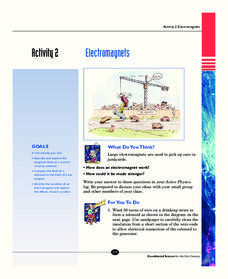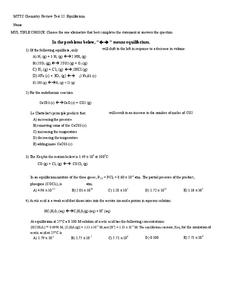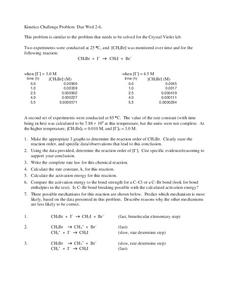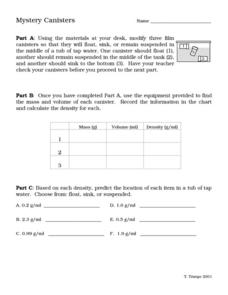Curated OER
It's Natural!
Here's a nicely designed learning exercise that will allow your young scientists to learn about common materials and products that come from nature. They also looks at synthesized products that come from a factory. This simple matching...
Curated OER
Examining the Stages in Ecological Succession
For this ecosystems worksheet, students use illustrations and descriptions of four ponds to determine the order of succession. Students complete 8 fill in the blank questions and 5 short answer questions.
It's About Time
Volcanos and the Atmosphere
In the summer of 1815, snow fell every month in New England. Was this related to the volcanic eruption of Tambora in Indonesia earlier in the year? Young scientists design their own experiments to research the long-term effect a volcanic...
It's About Time
Electromagnets
Young scientists build their own electromagnet and test it by picking up paperclips. Analysis questions evaluate knowledge at the end of the activity.
NASA
Rocket Wind Tunnel
Using a teacher-built wind tunnel constructed from a paper concrete tube form, a fan, and a balance, individuals determine the amount of drag their rocket design will experience in flight. Pupils make modifications to increase the...
It's About Time
Slinkies and Waves
Slinkies® are a great tool for visualizing waves. Pupils work in groups to create both transverse and longitudinal waves before using a polarizer to analyze the ways they are able to travel.
It's About Time
The Doppler Effect
In 1842, Christian Doppler proposed a theory relating the change of wavelengths based on motion. Young scholars observe the Doppler Effect on a small scale in a ball, on a larger scale from a car, and on the largest scale studying the...
Teach Engineering
Backyard Weather Station
Challenge young meteorologists to apply their knowledge of weather to build their own weather stations. The resource provides the directions to build a weather station that contains a wind vane, barometer, thermometer, and rain gauge....
It's About Time
Inferences of Waves
Building on the previous lesson, scholars use Slinkies to create standing waves. They graph waves on a calculator and then apply their knowledge to both sound and light waves. This is the fourth in a series of nine lessons.
It's About Time
Speedy Light
We know the speed of light, but can we measure the speed of dark? During the lesson, scholars perform gedanken, or thought experiments related to the speed of sound and the speed of light.
Curated OER
Recombination and Pedigrees
Biology aces answer four questions about genetic recombination and nine questions about pedigrees. This worksheet is very focused on these two topics. Most of the pedigree questions relate to the genetic disorders, Alkaptonuria and...
Curated OER
Equilibrium
In this equilibrium worksheet, students predict the concentrations of solutions at equilibrium and apply Le Chatelier's principle to systems at equilibrium. This worksheet has 15 multiple choice questions.
Curated OER
Kinetics Challenge Problem
In this kinetics worksheet, students use date from two experiments to determine the reaction order, calculate the rate constant and activation energy, and predict the mechanism for the reaction. This worksheet has 7 problems to solve.
Curated OER
Alternative Medicine
In this science experiment worksheet, 6th graders answer 5 multiple choice questions about the Hahnemann control experiment and complete 3 graphic organizer that relate to the experiment.
Curated OER
Friction 1
In this friction worksheet, students test heavy and light objects to see if the more friction of the heavier object makes it easy or harder for it to slide. Students also answer 5 questions.
Curated OER
Water Web-- Weather: Something We Talk a Lot About But Can't Change
In this science worksheet, learners study weather prediction by reading and completing activities in this 8 page newsletter. Students classify clouds, study weather prediction instruments, learn weather proverbs and signs and learn to...
Curated OER
Starch is Everywhere
In this science activity, students add a few drops of iodine solution to each of 10 substances to determine if they contain starch. The iodine will turn blue if the item contains starch.
Curated OER
Trade Winds
In this trade winds instructional activity, students complete multiple choice questions on trade winds and how they affect the weather. Students complete 3 questions.
Curated OER
MLTI region
In this MLTI region instructional activity, students answer multiple choice questions about the MLTI region and other NASA missions. Students answer four questions.
Curated OER
Climate Change
In these science worksheets, 5th graders explore aspects of weather and recycling. In the first instructional activity, students are given five questions about weather which they match to the statement about weather that corresponds to...
Curated OER
Mystery Canisters
In this density worksheet, students modify three film canisters in order to make one float in a tank of water, another suspend in the middle of the tank, and the third should sink to the bottom. They collect data on their canisters and...
Curated OER
Properties of Air Activity
In this properties of air worksheet, students experiment with a jar, a plastic bag and rubber bands to simulate that air takes up space and exerts pressure. They make observations and answer questions about their experiment.
Curated OER
Volcanic Violence
In this volcanic violence worksheet, students interactively answer 5 multiple choice questions, then click to find answers and explanations.
Curated OER
Weather & Climate; Knowledge Quiz
In this weather and climate quiz worksheet, students complete a set of 10 multiple choice questions covering a variety of concepts related to climate and weather.

























